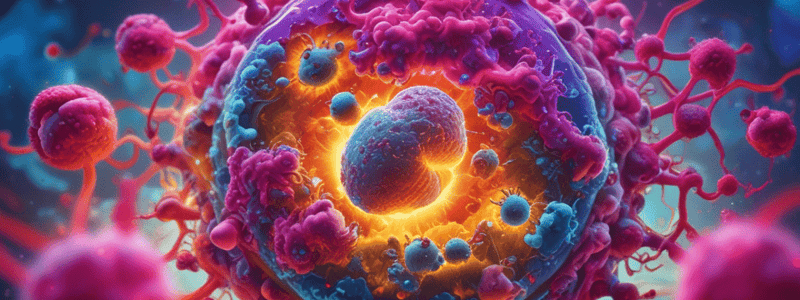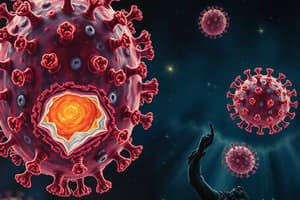Podcast
Questions and Answers
Which immune response is responsible for the rapid production of type 1 interferons following viral infection?
Which immune response is responsible for the rapid production of type 1 interferons following viral infection?
- Cytotoxic T lymphocytes (CTLs)
- Antibodies
- Innate immune response (correct)
- Natural killer (NK) cells
What happens around day 5 of viral infection according to the text?
What happens around day 5 of viral infection according to the text?
- Virus-specific cytotoxic T lymphocytes (CTLs) reach a plateau (correct)
- The innate immune response is activated
- Antibody levels decrease
- The initial exposure to the virus occurs
During the early innate immune response (Days 0-2), what is the role of natural killer (NK) cells?
During the early innate immune response (Days 0-2), what is the role of natural killer (NK) cells?
- Producing antibodies
- Attacking infected cells (correct)
- Slowing down viral replication
- Releasing more viruses
When do virus-specific antibodies begin to be produced according to the text?
When do virus-specific antibodies begin to be produced according to the text?
What do virus-specific CTLs continue to do as infected cells are targeted and destroyed?
What do virus-specific CTLs continue to do as infected cells are targeted and destroyed?
What is the role of type 1 interferons in the context of viral infections?
What is the role of type 1 interferons in the context of viral infections?
What is the main function of antibodies after the virus has been eliminated from the body?
What is the main function of antibodies after the virus has been eliminated from the body?
Which mechanism involves the activation of innate immune responses via pattern recognition receptor activation?
Which mechanism involves the activation of innate immune responses via pattern recognition receptor activation?
How do antibodies contribute to protection against viral infections?
How do antibodies contribute to protection against viral infections?
What is a key role of type 1 interferons in combating viral infections?
What is a key role of type 1 interferons in combating viral infections?
What is the main role of antibodies in limiting the spread of viruses?
What is the main role of antibodies in limiting the spread of viruses?
Which process involves antibodies marking virus-infected cells for destruction by immune cells?
Which process involves antibodies marking virus-infected cells for destruction by immune cells?
Which immune cells use the same mechanisms for killing virus-infected cells?
Which immune cells use the same mechanisms for killing virus-infected cells?
What is the main limitation of antibodies in combating established viral infections within host cells?
What is the main limitation of antibodies in combating established viral infections within host cells?
Which receptors play a key role in recognizing viral patterns during an infection?
Which receptors play a key role in recognizing viral patterns during an infection?
What is the role of type 1 interferons in the antiviral defense mechanism?
What is the role of type 1 interferons in the antiviral defense mechanism?
Which receptors detect unique patterns or structures associated with viruses in infected cells?
Which receptors detect unique patterns or structures associated with viruses in infected cells?
What is the primary function of IFNs in the cytokine-induced antiviral state?
What is the primary function of IFNs in the cytokine-induced antiviral state?
Which of the following is NOT a function of the innate immune response against viral infections?
Which of the following is NOT a function of the innate immune response against viral infections?
How do type 1 interferons affect adjacent uninfected cells in the context of a viral infection?
How do type 1 interferons affect adjacent uninfected cells in the context of a viral infection?
What is the primary role of type 1 interferons in limiting viral spread within the body?
What is the primary role of type 1 interferons in limiting viral spread within the body?
What is the main function of antibodies in the context of viral infections?
What is the main function of antibodies in the context of viral infections?
Which immune response provides a more targeted and specific defense against pathogens after the initial innate immune response?
Which immune response provides a more targeted and specific defense against pathogens after the initial innate immune response?
What is the fate of viral particles tagged by antibodies for destruction by immune cells like macrophages or neutrophils?
What is the fate of viral particles tagged by antibodies for destruction by immune cells like macrophages or neutrophils?
How do antibodies primarily prevent the spread of viruses within the body?
How do antibodies primarily prevent the spread of viruses within the body?
What is the primary function of spike proteins on the surface of a coronavirus?
What is the primary function of spike proteins on the surface of a coronavirus?
How does excessive inflammation during a viral infection contribute to the severity of illness?
How does excessive inflammation during a viral infection contribute to the severity of illness?
In the context of viral infections, what triggers the body's inflammation response?
In the context of viral infections, what triggers the body's inflammation response?
How does a coronavirus evade the host immune response during infection?
How does a coronavirus evade the host immune response during infection?
What is the critical balance highlighted in the text related to viral infections and immune responses?
What is the critical balance highlighted in the text related to viral infections and immune responses?
How do viruses enter host cells?
How do viruses enter host cells?
What is the main purpose of viruses utilizing host cell machinery for nucleic acid and protein synthesis?
What is the main purpose of viruses utilizing host cell machinery for nucleic acid and protein synthesis?
Why are viruses considered obligatory intracellular microorganisms?
Why are viruses considered obligatory intracellular microorganisms?
What is the primary function of virus-specific CTLs in infected individuals?
What is the primary function of virus-specific CTLs in infected individuals?
Which process do viruses use to escape into the cytosol once inside host cells?
Which process do viruses use to escape into the cytosol once inside host cells?
What is the initial step for viruses to infect host cells?
What is the initial step for viruses to infect host cells?
Why do viruses induce tissue damage indirectly according to the text?
Why do viruses induce tissue damage indirectly according to the text?
What role do host cell surface proteins play in the infection mechanism of viruses?
What role do host cell surface proteins play in the infection mechanism of viruses?
Why are viruses commonly referred to as microorganisms or microbes despite being debatable as organisms?
Why are viruses commonly referred to as microorganisms or microbes despite being debatable as organisms?
What distinguishes viruses from other microorganisms?
What distinguishes viruses from other microorganisms?
Flashcards are hidden until you start studying




